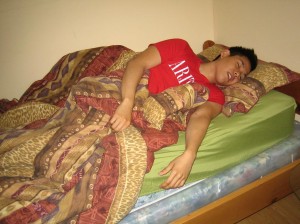A nocturnal panic attack is characterized by the abrupt waking and feeling of terror. This is different from a night terror since the individual can recall the attack upon waking up in the morning. A panic attack tends to occur in the middle stages of sleep particularly when the individual is moving on from the 2nd stage to the 3rd stage of sleep. If an individual experiences a panic attack at night, there is likelihood that it can also occur during daytime or the attacks can be triggered by other conditions such as sleep apnea or a seizure disorder.
http://youtu.be/dlzhITPSH04
Respiratory symptoms of a panic attack
In most cases of nocturnal or nighttime panic attacks, they are described by breathing difficulties, hyperventilation as well as a fast or erratic heart rate. These symptoms can cause the twitching of the arms and legs or numbness and tingling in the feet and hands. In some individuals, they feel tightness or pain in the chest area. Some individuals who suffer from a nocturnal panic attack perceive it as a heart attack or stroke and the fear felt can worsen the symptoms.

In some cases, those who experience nocturnal panic attacks wake up abruptly with a feeling of choking or suffocating. In such cases, the individual can make a gagging sound or thrash with their legs and arms. Even though this feeling can oftentimes have a physical cause such as the constriction of the airways triggered by certain conditions, there are cases where there is no physical cause at all.
Sweating
Profuse sweating is another indication of a nocturnal panic attack. The sweating can be accompanied by other changes in the body temperature such as feeling chilled or hot flushes. The flushing of the face is also an indication of a nocturnal panic attack.
Intense fear
Always bear in mind that intense feeling of fear is a symptom common to all cases of nocturnal panic attacks. Just like with daytime attacks, this feeling often has no rational cause. An individual can abruptly wake up with a feeling of dread or doom that can last up to 20 minutes even after the physical symptoms have diminished. Some can also feel as if they are dissociated from their bodies or from reality.
Take note that since panic attacks occur in the early stages of sleep, they are rarely linked with nightmares. The physical symptoms can instigate fear and these symptoms often make the fear even more intense. Additionally, the fear of having another attack can also contribute to the occurrence of more panic attacks.
If you suspect that an individual is suffering from panic attacks while sleeping, these indications clearly show that he/she has the condition. Most individuals who have experienced this attack claim that it can be quite frightening. If you want to learn more about this condition, read here.
